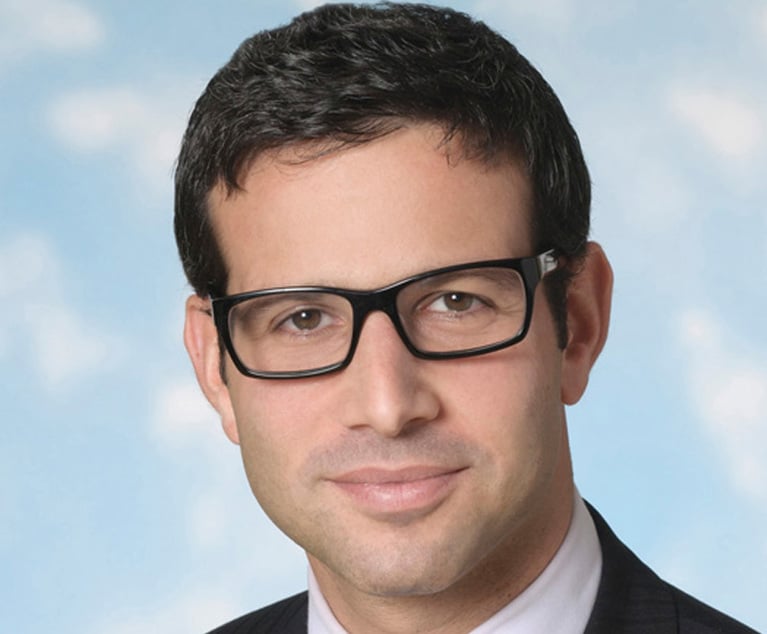 Texas Attorney General Ken Paxton. Photo: Diego M. Radzinschi/ALM
Texas Attorney General Ken Paxton. Photo: Diego M. Radzinschi/ALMKen Paxton Escapes 3rd-Party Designation in Securities Fraud Litigation
Texas Attorney General Ken Paxton won't be designated as a responsible third party in securities fraud litigation involving two men who were complainants in Paxton's criminal felony securities fraud charges.
July 22, 2020 at 01:33 PM
5 minute read
Texas Attorney General Ken Paxton won't have to face responsibility in a lawsuit alleging he failed to counsel his clients properly, landing them in litigation for securities fraud.
The Fifth Court of Appeals in Dallas on Tuesday ruled that a trial court did not abuse its discretion by refusing an effort to designate Paxton as a responsible third party who might dilute the defendants' liability for the plaintiff's alleged injuries.
Paxton has been under indictment since 2015, nearly his entire time as attorney general, for felony securities fraud charges. He's pleaded not guilty, and the case is still pending. This civil litigation involves two of the men who are complainants in Paxton's criminal case: Byron Curtis Cook and Joel Hochberg.
The majority opinion by Justice David Bridges, joined by Justice Amanda Reichek, determined that Cook, Hochberg and a company called Trade Rare did not show that the trial court clearly abused its discretion when it refused to allow them to designate Paxton as a responsible third party. That's why the court denied the mandamus petition.
But a dissenting opinion by Justice Leslie Osborne said that she would have granted the petition that tried to make Paxton a responsible third party. The dissent provides a glimpse of the allegations that Paxton provided incompetent legal counsel that contributed to the lawsuit being filed.
|'Wrong result'
Mitch Little, a partner in Scheef & Stone in Frisco who represented Calco Land Development and Paxton, wrote in an email that he is delighted with the ruling.
"There is no set of facts in which General Paxton could be responsible for the harm Calco incurred in this case," said Little. "Byron Cook's company Unity Resources defrauded our client, and we look forward to proving that to a jury."
But Alex Moore, a partner in Carrington, Coleman, Sloman & Blumenthal in Dallas, said he is disappointed with the Fifth Court's decision not to designate Paxton as a responsible third party.
"We feel like it's the wrong result," said Moore. "We are not sure why the court reached the result it did."
|Incompetent counsel allegations
The dissenting opinion explained that in this litigation, Calco Land Development alleged it was a victim of securities fraud, and asserted claims related to fraud, breach of fiduciary duty, and Texas Securities Act violations.
Read the full dissent
But three of the defendants—Cook, Hochberg and Trade Rare—alleged that Paxton was a manager, member and counsel to another defendant, Unity Resources. They said Paxton contributed to Calco's harm because he did not diligently and competently counsel Unity and Cook about compliance with securities regulations and corporate governance duties, explained the dissent.
Specifically, Paxton failed to counsel about "the propriety of and disclosures regarding interested-party transactions and direct sales of mineral acreage." This type of purchase is what caused Calco's claims, the dissenting opinion said.
Cook, Hochberg and Trade Rare also claimed that Paxton failed to advise Calco's owner about transactions between Cook, Unity and other managers and members of Unity. This included transactions for land banking of mineral acreage that Unity purchased.
Another allegation is that Paxton disclosed privileged and confidential information to Calco, but didn't tell Unity's counsel, and that hurt the way that Cook, Hochberg and Trade Rare could defend themselves in the litigation, the dissent said.
In her dissent, Osborne said she thought there were sufficient allegations to designate Paxton as a responsible third party.
|Link or no link?
Paxton has pleaded not guilty to two charges of first-degree felony securities fraud and third-degree felony for failing to register as an investment adviser representative. Those two indictments said that Paxton unlawfully and intentionally offered to sell Cook and Hochberg stock worth $100,000 or more in Servergy, which is a technology company in McKinney, Paxton's home town. Paxton engaged in fraud by intentionally failing to disclose material facts: He would be compensated with 100,000 shares in Servergy "for selling stock" to the complainants; and he hadn't put his own money in Servergy, the indictment said.
Little, the lawyer for Calco and Paxton, said that the Calco civil litigation is unrelated to the facts underlying Paxton's criminal charges.
"Byron Cook's company Unity Resources sold Calco a mineral interest and carved off acreage and cash for itself from the deal without disclosing that to Calco," said Little.
However, Moore, who represents Cook, Hochberg and Trade Rare, said that he has argued there's a link with the criminal charges.
Moore pointed to an appeal by Cook in a separate case that's pending before the Texas Supreme Court. Cook alleged in the case that Paxton orchestrated his friend who owns Calco to sue Cook, and had two other friends file two more lawsuits against Cook.
It was retaliation for Cook's cooperation with law enforcement in Paxton's criminal case, Cook argued.
Related story: Prosecutors Reword Paxton Charges in New Indictments
This content has been archived. It is available through our partners, LexisNexis® and Bloomberg Law.
To view this content, please continue to their sites.
Not a Lexis Subscriber?
Subscribe Now
Not a Bloomberg Law Subscriber?
Subscribe Now
NOT FOR REPRINT
© 2025 ALM Global, LLC, All Rights Reserved. Request academic re-use from www.copyright.com. All other uses, submit a request to [email protected]. For more information visit Asset & Logo Licensing.
You Might Like
View All
Ex-Six Flags CLO Lands New C-Suite Post—This Time as HR Chief

Kirkland's Daniel Lavon-Krein: Staying Ahead of Private Equity Consolidation

Trump Mulls Big Changes to Banking Regulation, Unsettling the Industry

11 Red State AGs Demand Damages in Antitrust Lawsuit Shaming ESG Climate Investors
3 minute readLaw Firms Mentioned
Trending Stories
Who Got The Work
Michael G. Bongiorno, Andrew Scott Dulberg and Elizabeth E. Driscoll from Wilmer Cutler Pickering Hale and Dorr have stepped in to represent Symbotic Inc., an A.I.-enabled technology platform that focuses on increasing supply chain efficiency, and other defendants in a pending shareholder derivative lawsuit. The case, filed Oct. 2 in Massachusetts District Court by the Brown Law Firm on behalf of Stephen Austen, accuses certain officers and directors of misleading investors in regard to Symbotic's potential for margin growth by failing to disclose that the company was not equipped to timely deploy its systems or manage expenses through project delays. The case, assigned to U.S. District Judge Nathaniel M. Gorton, is 1:24-cv-12522, Austen v. Cohen et al.
Who Got The Work
Edmund Polubinski and Marie Killmond of Davis Polk & Wardwell have entered appearances for data platform software development company MongoDB and other defendants in a pending shareholder derivative lawsuit. The action, filed Oct. 7 in New York Southern District Court by the Brown Law Firm, accuses the company's directors and/or officers of falsely expressing confidence in the company’s restructuring of its sales incentive plan and downplaying the severity of decreases in its upfront commitments. The case is 1:24-cv-07594, Roy v. Ittycheria et al.
Who Got The Work
Amy O. Bruchs and Kurt F. Ellison of Michael Best & Friedrich have entered appearances for Epic Systems Corp. in a pending employment discrimination lawsuit. The suit was filed Sept. 7 in Wisconsin Western District Court by Levine Eisberner LLC and Siri & Glimstad on behalf of a project manager who claims that he was wrongfully terminated after applying for a religious exemption to the defendant's COVID-19 vaccine mandate. The case, assigned to U.S. Magistrate Judge Anita Marie Boor, is 3:24-cv-00630, Secker, Nathan v. Epic Systems Corporation.
Who Got The Work
David X. Sullivan, Thomas J. Finn and Gregory A. Hall from McCarter & English have entered appearances for Sunrun Installation Services in a pending civil rights lawsuit. The complaint was filed Sept. 4 in Connecticut District Court by attorney Robert M. Berke on behalf of former employee George Edward Steins, who was arrested and charged with employing an unregistered home improvement salesperson. The complaint alleges that had Sunrun informed the Connecticut Department of Consumer Protection that the plaintiff's employment had ended in 2017 and that he no longer held Sunrun's home improvement contractor license, he would not have been hit with charges, which were dismissed in May 2024. The case, assigned to U.S. District Judge Jeffrey A. Meyer, is 3:24-cv-01423, Steins v. Sunrun, Inc. et al.
Who Got The Work
Greenberg Traurig shareholder Joshua L. Raskin has entered an appearance for boohoo.com UK Ltd. in a pending patent infringement lawsuit. The suit, filed Sept. 3 in Texas Eastern District Court by Rozier Hardt McDonough on behalf of Alto Dynamics, asserts five patents related to an online shopping platform. The case, assigned to U.S. District Judge Rodney Gilstrap, is 2:24-cv-00719, Alto Dynamics, LLC v. boohoo.com UK Limited.
Featured Firms
Law Offices of Gary Martin Hays & Associates, P.C.
(470) 294-1674
Law Offices of Mark E. Salomone
(857) 444-6468
Smith & Hassler
(713) 739-1250






